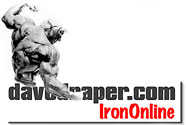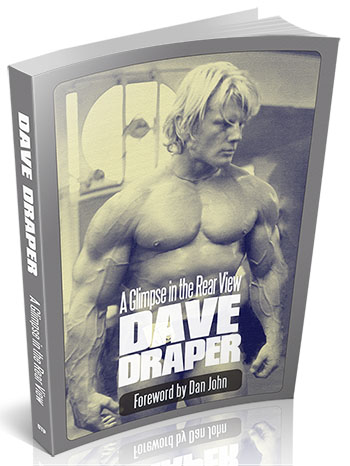An Old-School Q&A

Dave Draper's Bomber Blend Protein
Download the full Draper here newsletter
in printable, live-link, pdf format, here.
These questions come up regularly, so maybe we should gather together for a look at old-school Southern California bodybuilding in a question and answer session. Ready? Okay, let's get right to it.
Q: What were the popular training methods used back in the '60s?
A: The basic movements were applied with good order, repetition, force and regularity. The methods were not yet analyzed, overly intellectualized or even named. I guess the popular training MO among the original Gold's champs was volume training: three exercises per muscle group, reps in the 12, 10, 8, 6 range, with max-power reps thrown in when the urge was unstoppable. Each muscle group was trained compatibly twice a week and the gym visited at least five of the seven days. Squats and deadlifts counted big time, and supersets were plentiful. Heavy dumbbells had a special place in our hearts.
One generally amped the training in the spring and summer, and powered it in the fall and winter.
Q: Describe the diet you used back in those days.
If you sat down with us after a workout at our favorite Marina cafe, you'd see us order hamburger patties and eggs, home fries and whole wheat toast. Our diets were high protein with an accent on meat and milk products, medium carbs with plenty of salad and fresh fruits and medium fats with no fried food or junk.
With me, some things never change.
Q: How long would bodybuilders train back then?
There was a season for hard training and a season for harder training. The average time in the gym was 90 to 120 minutes, five days a week. When contest preparation loomed (spring, summer and early fall), training twice a day was a common practice. This added another hour to the total.
Q: Today people say you will risk overtraining if you train beyond one hour, but back then you routinely lifted for two hours or more, yet got amazing results. How would you explain the progress that was made under these circumstances?
I don't see how a competitor can make progress with much less. Overtraining can be a problem, and it must be monitored closely. Training to the edge is not the healthiest method of training, but it is the only method for superior championship.
Q: Was cardio used as often as it is today?
You hardly saw cardio training in our neighborhood. There was no stationary bike to mount at the gym, no treadmill for miles and miles and the other swell gadgets (ellipticals, stair masters, goofy gofers) were yet to be invented.
Q: Back in the 1970s, bodybuilders training at Gold's seemed to encourage one another more and camaraderie between the athletes was more evident than it is today. How would you explain this different mentality?
The activity has become extraordinarily popular and busy, the sport sharply competitive and crowded, the diversion commercialized and usurped and the world swifter and tighter, more jaded and impersonal. Today, it's not who you are; it's who you are compared to him or her. It's not who you are; it's what you're worth.
Q: How did existing clientele respond to Arnold when he arrived at Gold's for the first time?
People in Venice in the '60s were not easily excited. The kicked-back nature of the stony beach community in a time of questioning and doubts influenced our reception of Arnold. And bodybuilding was still a novelty, an anomaly, remember...a half-pint in a rolled-up brown paper bag.
"Arnold, he's the big kid from Europe with muscles and an odd accent. He won bodybuilding contests over there, Germany, I think, and dresses funny. Looks like he learned to lift at Camp Munich."
We liked him, helped him, taught him by not teaching him, and watched him grow and grow.
The rumble you heard in the background was bodybuilding in its early stages of take-off... Five, Four, Three, Two, One ...
Q: What was gym owner Joe Gold like? Was he influenced much by the bodybuilders who trained at his gym?
Joe was 20 years my senior and the odd combination of hard work and the beach life styled his activities. He lifted and played volleyball in the sun, and went out to sea as a merchant marine first mate when too much fun was too much fun. He was a leader in Speedos, an engineer in sandals and a solver of problems, personal and mechanical, wherever they sprang. The Gold was not a social hound; he stuck by his true friends and didn't take crap from anyone. He watched and listened, scored and toured, improvised and learned.
Joe was smart and authentic and tough.
Q: I have seen some great photos of you and Arnold training together. How influential was Arnold on your training and bodybuilding progress?
Arnold was impressive then, almost as impressive as now. I was a loner who, like a wolf, knew and trusted and attended his own territory. I could live beside a good man without doubt, envy or antagonism. Arnold was a strong force and his energy and drive were infectious. His training at first was clumsy -- nothing to emulate -- and gained grace and meaning day by day.
He and I and the rest of the small mob fed upon each other generously. Our unity was evident as were our developing training styles and individuality. Intensity begets intensity and our wills to win rose to the surface like helium-filled life preservers.
Q: Given bodybuilding was more of a lifestyle than a career back in those times, how did people finance their gym efforts? How did you balance a job with your bodybuilding endeavors?
Not very well. Making a buck was as hit and miss as clamming off the shoals of Nova Scotia. There were rare jobs in the film industry, cheapie jobs in the sparse neighborhood gyms, promises from pushy musclebuilding magazine tycoons and occasional miracles.
I resorted to crafting furniture (beats starving), Frank Zane taught high school science (serves intelligently), some delivered mail (gotta eat) and some had real jobs (engineer) or slept in their cars. Some had mysterious financiers.
Q: What was life like as a bodybuilder in general back in those times?
I never thought of myself as a bodybuilder, as if that was something to be. The term never rolled off my lips with affection. The early lifters from Muscle Beach were no fonder of the term than I. We were weight lifters -- people who lift weights. "Bodybuilder" had a connotation as likeable as "mercenary" when speaking of soldiers, or "camper" when referring to explorers or "star-gazing" when discussing astronomy.
Who knows? Maybe they hung at the beach and waited for life to happen. You'd have to be one to know. I trained hard and slipped out the back door, applied myself to forming wood and lived a simple life.
Q: What would bodybuilders do for fun after training? What was the social life like back then?
Though there were a dozen parties that brought us together over a two- or three-year period -- fun occasions with laughter, promise and cheer, good food and no drink -- we mostly went our own ways.
I was married, Frank was married and busy, Arnold and Franco had their interests and enjoyed the bodybuilding life as Joe Weider provided for their basic needs. We crossed paths for lunch or breakfast or trips for competition or exhibition and promotion.
Life's a blur as you recall it 40 years later. It was fun, tough, heart-breaking, alive, fulfilling, energizing and exhausting.
Q: What was the training equipment like? Did it have many limitations compared to what is on offer today?
Joe Gold did a great deal to improve the then-current musclebuilding equipment: designing, engineering, enlarging, beefing up, broadening and thickening. Barbells and dumbbells did the trick and various improvisations of the basic benches and racks filled our needs.
Necessity is the mother of invention and where there's a will there's a way. The earnest lifter will get where he's going, especially when it's over, around and through the limitations before him. Nothing like small obstacles to overcome the mountain.
We could do with less nonsense now, and more guts and hard work and spontaneous invention.
Q: Did you sometimes have to improvise to get the most out of a piece of equipment?
I always found myself modifying my training groove and exercise performance to accommodate age and injury or specific muscle engagement. If I wasn't adjusting my set and rep, I was not focused and in tune.
Q: How big of a factor were nutritional supplements for building physiques back then?
Quality supplements were important then and are important now. Nutrition plays a significant role in health, performance and development, but you don't want to go broke. Stick to the basics: a good protein powder, a good vitamin mineral, extra C, D and EFAs.
Q: What kind of clothing did you wear in the gym and on the street? Was there a specific dress style for bodybuilders back then?
Few of us were fancy dressers on the street and certainly not in the gym. Think t-shirt, tanktop, sweatshirt and flannel shirt and jeans. We wore our clothes hard and adjusted them to fit as needed and for comfort. The gear came later as the industry expanded.
We wore layers in the winter and shed them as the workouts warmed things up; sweatshirts and t-shirts often lost their sleeves in the middle of a workout if needed. It was cool to see the bulk and muscle bulging through the well-worn clothes, but it was not the main source of entertainment. There was work to do.
Speaking of which, maybe we should get a job. A job? Is that anything like work? And when would I take off, fly, soar and glide?
If anybody asks, you haven't seen me lately... better yet, tell 'em I'm busy...
DD
*****
Take a trip over to our
Musclebuilding Q&A Blog
... where Dave allows us a peek into his email outbox.
Did you sign up for Dave's expanded email yet?
It's free, motivating and priceless!
We'll also send you a link to Dave's free
Body Revival Tips and Hints e-report with your confirmation notice.

